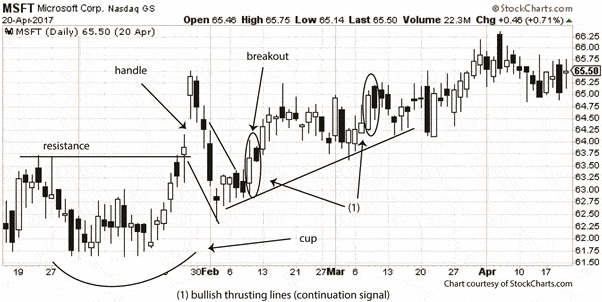Cup and Handle Formation-Bullish Continuation Pattern
The “cup and handle formation” is a bullish signal pointing to a continuation of the current trend. It may extend over several weeks or even months and contains specific attributes.
As with any continuation pattern, you rely on a confirmation in one form or another. This may occur as a second technical price signal, a candlestick continuation, volume spike, or change in momentum.
There are several parts to the cup and handle. First is the cup, which is a rounded bottom extending over time. As the shape of the cup is completed, expect the handle to emerge. This is a swing trade in the opposite direction, characterized by a specific channel between resistance and support, forming as a pennant or similar channel movement and, quite often, separated from the “cup” with an upside gap. As the handle declines and concludes, price reverses, moving again to the upside and setting up as a breakout from previous resistance.
The Cup Depth
Cup depth should represent retracement of about one-third of the prior advance at the most. In some especially volatile cases, retracement could also be much greater, so the one-third guidance is not an absolute requirement.
The Handle
Handle should be understood as a consolidating offset against the bullish movement in the greater scheme of price behavior. As a pullback, the handle is a short-term aspect of the pattern. Because it is a retracement, the caveat for all retracements applies here. Expect a relatively short-term period of time in order to predict a strong continuation of the bullish trend.
At this point – the conclusion of the three phases (cup, handle, breakout), look for confirmation in the form of a bullish continuation signal. While this may develop as an ascending triangle, it is more likely to appear as one of many bullish candlestick continuation signals. This confirms the cup and handle as the initial bullish indicator.
Some chartists like to set price targets following the cup and handle, based on duration of the pattern, degree of price movement, and strength of the subsequent continuation. However, as an initial effort, recognizing the pattern is essential for identifying and then confirming its value in predicting price direction.

The initial bullish trend moved price from $61.75 to resistance of $63.75 in approximately a two-week period. At that point, the rounded bottom of the cup began to form. It lasted approximately 1 ½ months.
The handle formed after a strong upward gap and formation of a short-term bearish island cluster of two sessions (defined as movement away from price range with gaps on both sides). The handle moved price from $64.50 down to $62.50 over less than one week.
A breakout followed, moving price above resistance of $63.75. The bullish continuation initiated by the cup and handle was confirmed at the point of breakout by a thrusting lines candlestick, a bullish continuation. The ensuing bullish trend, marked by the trendline, continued into March, when a retracement appeared. This was followed immediately by another bullish thrusting lines pattern, indicating that the bullish trend was not ending.
Every cup and handle is slightly unique, so do not expect the exact configuration to occur in every case. So much depends on volume and volatility in effect at the moment. Economic and fundamental news (or rumor) also determine how acute the rounded bottom of the cup will be, and how long the handle will ensure.
Can the cup and handle fail or turn out as a false signal? Yes. All reversal and continuation patterns are indications only, and cannot ever lead to 100% confidence. However, as with all strong signals, reliance on the initial pattern and confirmation improves your chances for a successful timing of entry and exit and overall improvement in chart reading capabilities.
To learn more about the cup and handle in its many forms, go to Bullish Cup and Handle Pattern for an e-book on the topic. This e-book provides an in-depth analysis of the pattern and how you can use it to trade with greater success.




Comments are closed.